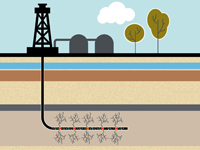
North Carolina is officially open for fracking, after lifting a ban on the practice—and enacting criminal penalties for spilling trade secrets associated with it. With passage of the Energy Modernization Act, North Carolina joins the growing ranks of states that have legislated to protect confidential fracking information.
North Carolina’s new law prompted us to update our chart summarizing the key provisions of similar legislation in other states. It can be seen here.
North Carolina’s new law, enacted June 4, is notable for criminalizing the wrongful disclosure of such information, making it one of the nation’s more aggressive fracking laws. Under the Act, disclosure can result in a misdemeanor charge when confidential information is revealed “knowingly and willfully.” The law does not further define that phrase. Such conduct can be punished with a maximum penalty of 45 days’ community service. (The initial draft of the bill proposed by the state senate would have treated unlawful disclosure of confidential fracking information as a Class I felony.) Violators may also face civil penalties.
The Act achieves some balance by making fracking information presumptively non-confidential and available to the public. Businesses and individuals wishing to obtain protection for fracking information as trade secret or confidential must make an affirmative showing that the information qualifies as such pursuant to North Carolina’s statute governing trade secret and confidential information, G.S. 142-1.2.
The new legislation also provides for the creation of a panel of elected officials, industry professionals, conservationists and public health experts known as the Oil and Gas Commission, which has quasi-judicial powers. The Commission is charged with determining whether to extend confidential or trade secret protection to fracking information, including the composition of fracking fluids. The law provides for an appeal procedure should the Commission refuse to grant confidential or trade secret protection to particular information.
Legislation in other states frequently requires that entities disclose specific and detailed information concerning the contents of the fracking fluid before engaging in fracking activities. At least one state—Utah—requires public disclosure of the composition of fracking fluids after completion of fracking activities. Other states require that chemical families, at a minimum, be disclosed. North Carolina has not followed suit. Entities seeking a permit under the Act need only provide confidential information regarding the chemicals and constituents of their fracking fluid to the State Geologist, who is charged with maintaining the confidentiality of the information provided. The State Geologist will then make an independent determination regarding the fluid’s compliance with all state and federal laws and regulations. The Act does not specify the level of detail that must be shared with the State Geologist.
The comparative lack of required disclosures regarding the composition of fracking fluid coupled with criminal penalties for disclosing confidential fracking information mark North Carolina’s legislation as a strong protector of trade secret information for the industry.

